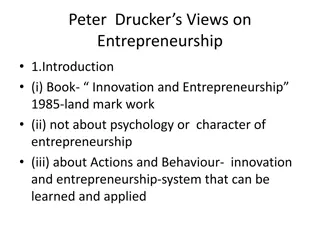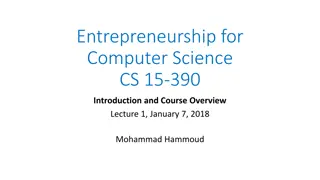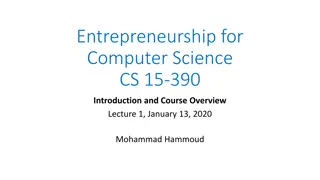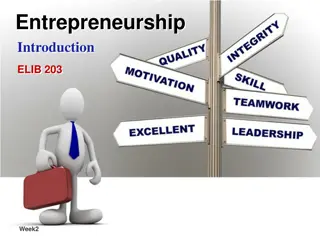Understanding Entrepreneurship: Traits, Impact, and Key Figures
Exploring the world of entrepreneurship reveals the essence of risk-taking, innovation, and driving economic growth. Entrepreneurs are the backbone of small businesses, driving change, and introducing groundbreaking ideas. Discover the origins and evolving definitions of entrepreneurship, along with the key traits that define successful entrepreneurs. Learn about the impactful role entrepreneurs play in shaping the economy and society, with examples of iconic figures like Sergey Brin, Mark Zuckerberg, and Elon Musk who have transformed our lives with their ventures. Delve into the diverse avenues of entrepreneurship, from starting new businesses to managing existing ventures, all while embracing risk and fostering innovation. Uncover the key theories that underpin the entrepreneurial mindset and drive towards success.
Download Presentation

Please find below an Image/Link to download the presentation.
The content on the website is provided AS IS for your information and personal use only. It may not be sold, licensed, or shared on other websites without obtaining consent from the author. Download presentation by click this link. If you encounter any issues during the download, it is possible that the publisher has removed the file from their server.
E N D
Presentation Transcript
Who among us is considering to start up a business? Who has already started a business?
An Entrepreneur An entrepreneur is one who undertakes. He is an owneror a managerof a business enterprise who makes money through risk and initiative. Origins: From the French entre and prendre [ between Take [undertake] meaning a merchant who acts as a go between for parties in the trading process. Richard Cantillion(1725) first used the word to denote those who carry risk in the economy.
Since then there have been many definitions A person who organises and manages a business undertaking, assuming the risk for the sake of profit a person who is willing to help launch a new venture or enterprise and accept full responsibility for the outcome.
Traits of Entrepreneurship oppurtunisstic risk takers (risk managers) in ambiguity they can see risk before it comes (sense) they can take failure and continue action oriented
What do Entrepreneurs do? they keep the economy running! over 90% of businesses are small businesses limited skills and capabilities the centre of world economy they are the agents of change innovators
Name a few entrepreneurs that changed our lives; Sergey Brin (Google) Mark Zuckerberg (Facebook) Steve Jobbs (Apple) Jack Dorsey (Twitter) Pierre Omidyar (eBay) Elon Musk (PayPal) Chad Hurley (Youtube) Who else???
Entrepreneurship may include; Starting a business Being creative and innovative in developing new products or services Managing an existing venture in such a way that it grows rapidly Accepting risk in the development of a venture
Key theories in Entrepreneurship The entrepreneur as innovator (Schumpeter) The alert entrepreneur ( Kirzner Kirzner) The entrepreneur as risk taker (Knight) The entrepreneur as superior manager (Marshall) The entrepreneur has no role (neo classical economics)
The 3 Ms To succeed in business you need the three Ms (Vesper 1990) Ms Margin to make a profit Margin to deal with the unexpected Margin to continue making profits when competitors attack by reducing prices
Ingredients of an entrepreneurial management style Sensitive to opportunities. alertness/network building Sensitive to margins evaluation skills needed Experimentation and piloting important Sensitive to risk but prepared to manage it rather than eliminate it. Ability to mobilise resources quickly to exploit opportunities Ability to manage failure of a venture without threatening overall capital.
Entrepreneurial management. How does it differ? Not formal and rigidly logical, more intuitive. High margin opportunities cannot be logically predicted, They arise through exploration, piloting, experimentation and luck Formal management necessary but can be brought in when needed. It is goals driven, not driven by the need to maximise profits.























